If you’re anything like me, you’ve probably spent countless hours researching the best ways to care for your backyard flock. Every detail matters when keeping our feathered friends happy and healthy, from their comfy coop to their daily feed. That’s why when I stumbled upon the question, can chickens eat cat food? I knew I had to find a definitive answer for all chicken enthusiasts.
Let me be upfront: feeding chickens cat food isn’t the best idea. While it may seem like a convenient way to add variety to their diet, some potential risks are associated with this practice. In this article, we’ll dive deep into the nutritional differences between chicken feed and cat food, discuss the possible effects of feeding cat food to chickens, and explore safer alternatives to ensure our beloved birds receive a well-balanced diet.
So, if you’ve ever been tempted to toss your kitty’s kibble into the coop, or you’re simply curious about the world of chicken nutrition, you’ve come to the right place. Keep reading as we unravel the mysteries of cat food and chickens, and help you make informed decisions about the best way to care for your clucking companions.
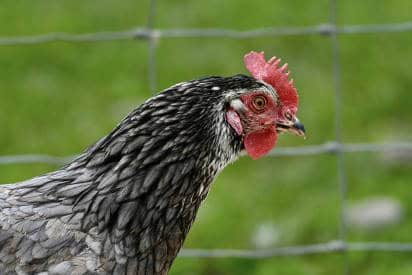
Nutritional Requirements for Chickens
Before we dive into the cat food debate, let’s review the essentials of chicken nutrition. Chickens need a well-balanced diet to stay in tip-top shape, and their daily requirements include proteins, vitamins, minerals, carbohydrates, and fats. A balanced diet is crucial for optimal growth, egg production, and overall health.
Proteins
Chickens require protein to build and repair their muscles, feathers, and other body tissues. Protein is especially important for young chicks, who are growing rapidly, and for laying hens that need the extra boost for egg production.
Vitamins
Vitamins are crucial in maintaining healthy immune, digestive, and reproductive systems. A well-rounded diet should include essential vitamins such as A, D, E, and K and a variety of B vitamins.
Minerals
Chickens need minerals like calcium, phosphorus, and magnesium to support strong bones, eggshell formation, and other bodily functions.
Carbohydrates
Carbs give chickens the energy they need to peck, scratch, and go about their daily lives.
Fats
Fats are essential for absorbing fat-soluble vitamins and providing energy, but they should be consumed in moderation.
[ChickenAffiliate]
Nutritional Composition of Cat Food
Now that we’ve covered the basics of chicken nutrition, let’s look at the ingredients commonly found in cat food. Cats are obligate carnivores, meaning they have specific dietary needs that differ significantly from those of our omnivorous chickens.
Animal-based proteins
Cat food typically contains high levels of animal-based proteins like chicken, fish, or beef to meet their carnivorous requirements. While this may sound appealing for chickens, it’s important to remember that cats and chickens have different protein needs.
Fats and oils
Cats rely on fats and oils for energy, so cat food often contains more fat than chicken feed. This could lead to weight gain and other health issues if fed to chickens in large amounts.
Carbohydrates
Cat food tends to have fewer carbohydrates than chicken feed, as cats have a limited ability to metabolize carbs.
Vitamins and minerals
Cat food is formulated with a specific blend of vitamins and minerals designed to meet feline dietary needs, which may not align with the nutritional requirements of chickens.
The Effects of Cat Food on Chickens
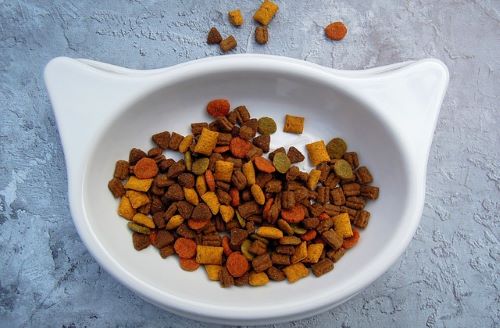
Now that we understand the differences in nutritional composition between chicken feed and cat food let’s explore the potential effects of feeding cat food to our clucking companions.
Potential benefits of feeding cat food to chickens
- High protein content: The high protein content in cat food could potentially benefit chickens during times of increased protein needs, such as molting or when a hen is resuming egg production after a break. However, this should be done cautiously and in moderation to avoid potential health risks.
- Variety in diet: Feeding cat food as an occasional treat could add variety to your chickens’ diet, making their meals more interesting and engaging.
Possible risks and side effects
- Excess protein and kidney issues: Feeding chickens too much protein can lead to kidney problems as their bodies struggle to process the excess. This is especially concerning if cat food becomes a significant part of their daily diet.
- Imbalanced nutrient ratios: The nutrient ratios in cat food are not designed for chickens, which means that relying on cat food as a primary food source could lead to imbalances and deficiencies in their diet.
- Inappropriate additives and ingredients: Some cat foods may contain additives, preservatives, or ingredients unsuitable for chickens, potentially causing health issues or digestive discomfort.
Alternatives to Cat Food for Chickens
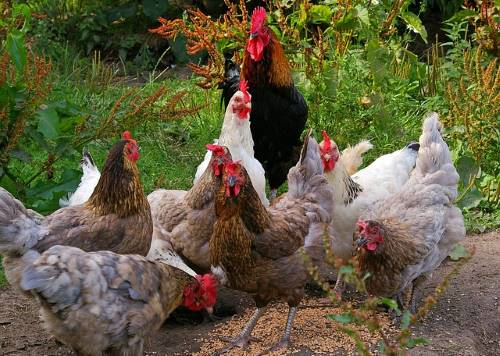
If you’re looking for ways to supplement your chickens’ diet or provide some variety, there are plenty of alternatives to cat food that will keep them happy and healthy.
Homemade chicken feed recipes
Consider mixing up a batch of homemade chicken feed using a combination of grains, seeds, and protein sources tailored to meet your chickens’ needs. This can be a cost-effective and rewarding way to ensure they receive a balanced diet.
Ensuring a balanced diet with various food sources
- Vegetables and fruits: Chickens love a good veggie or fruit treat, and these can provide essential vitamins and minerals. For a healthy snack, offer them leafy greens, carrots, squash, apples, or berries.
- Grains and seeds: A mixture of grains and seeds, such as corn, oats, barley, sunflower seeds, or flaxseed, can provide valuable carbohydrates and fats to energize your chickens.
- Protein-rich sources like mealworms and insects: Supplement your chickens’ protein intake with tasty treats like mealworms, crickets, or other insects. These can be purchased at pet stores or raised at home for sustainable protein sources.
The importance of grit and calcium supplementation
Don’t forget to give your chickens access to grit, which helps them grind down food in their gizzards. Additionally, laying hens require extra calcium for strong eggshells, so be sure to offer crushed oyster shells or another calcium source.
The Impact of Cat Food on Taste and Quality of Eggs
Feeding your chickens cat food could impact their eggs’ taste and quality. A chicken’s diet plays a significant role in the flavor of the eggs they produce. The high protein content and unique ingredients in cat food may alter the taste of the eggs, possibly resulting in an undesirable flavor.
If you’re raising chickens for their eggs, it’s essential to maintain a balanced diet to ensure high-quality, delicious eggs.
Wet vs. Dry Cat Food for Chickens
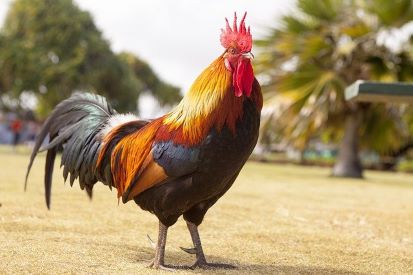
If you’re considering offering cat food as a treat for your chickens, it’s important to differentiate between wet and dry cat food. Wet cat food typically contains a higher moisture content and may spoil more quickly, attracting pests and bacteria to your chicken coop.
On the other hand, dry cat food is less likely to spoil quickly and is easier for chickens to peck at. If you occasionally give your chickens cat food, opt for dry cat food to minimize the risk of contamination and spoilage.
What Other Feeds Can Chickens Eat Apart from Cat Food?
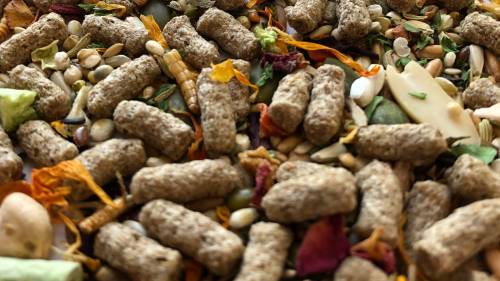
We’ve established that cat food isn’t ideal for our feathery friends. However, you might wonder if other animal feed types are safe for chickens to consume. In this section, we’ll explore five alternative feeds: dog food, rabbit food, sweet feed, goat feed, and horse feed, and discuss their suitability for chickens. So, let’s dive in and see which feeds make the grade.
Dog Food
Like cat food, dog food is high in protein, but its nutritional composition is tailored to the needs of dogs, not chickens. While it’s not harmful for chickens to consume dog food in small quantities, it shouldn’t be a primary food source.
If you have a small amount of dog food to spare, consider offering it as an occasional treat, but always supplement with a balanced chicken feed.
Read More: Can Chickens Eat Dog Food? The Truth Revealed
Rabbit Food
Rabbit food, which typically consists of pellets made from hay, grains, and vegetables, is generally safe for chickens. However, it lacks the protein and calcium needed for optimal growth and egg production.
While chickens can snack on rabbit food occasionally, it shouldn’t replace their regular feed.
Read More: Can Chickens Eat Rabbit Food? Simple Answer & Feeding Tips
Sweet Feed
Sweet feed is a mixture of grains, molasses, and other ingredients, typically formulated for horses and other livestock. Although sharing some sweet feed with your chickens might be tempting, it’s not recommended.
The high sugar content in molasses can lead to obesity and other health problems in chickens. Additionally, the feed may lack essential nutrients required for proper growth and egg production.
Read More: Can Chickens Eat Sweet Feed? The Surprising Truth Revealed
Goat Feed
Goat feed is another option that some chicken owners might consider, but it’s important to remember that it’s formulated for goats, not chickens. Goat feed often contains higher levels of copper, which can be toxic to chickens in large amounts. It may also lack the appropriate balance of nutrients that chickens need.
While it’s not an ideal choice, if you must share goat feed with your chickens, do so in moderation and always provide a balanced chicken feed.
Read More: Can Chickens Eat Goat Feed? Risks & Alternatives Explained
Horse Feed
Like sweet feed, horse feed is designed for horses’ nutritional needs, not chickens. It may lack the correct balance of nutrients, particularly protein and calcium, necessary for healthy chicken and egg production.
Feeding your chickens horse feed occasionally as a treat should be safe, but it should never become a primary food source. Stick to providing your flock with a well-balanced diet specifically designed for chickens.
Read More: Can Chickens Eat Horse Feed? Uncovering The Truth & Alternatives
Can chickens eat cat food – final thoughts
In conclusion, our adventure into the world of cat food and chickens has been an eye-opening experience! We’ve discovered that cat food may offer a tempting source of variety and protein for our feathered friends, but it’s not the most suitable option due to potential health risks and imbalanced nutrient ratios.
So, as much as our curious chickens might want to nibble on some kitty kibble, it’s best to stick to a well-balanced diet designed specifically for their unique nutritional needs. With many great alternatives available, from homemade chicken feed recipes to nutritious snacks like vegetables, fruits, and insects, there’s no need to rely on cat food to keep our backyard flocks happy and healthy.
Let’s explore new ways to provide the best care for our clucking companions while keeping the cat food where it belongs – in the cat’s bowl!
Related Articles:
